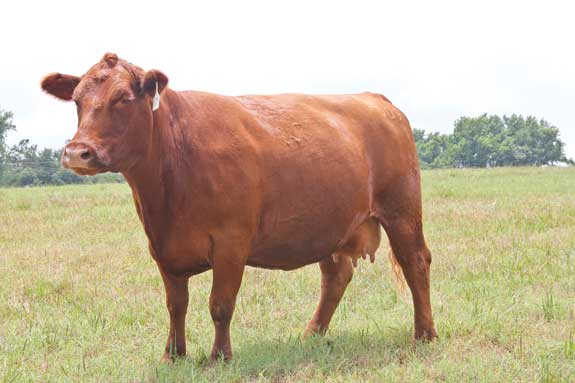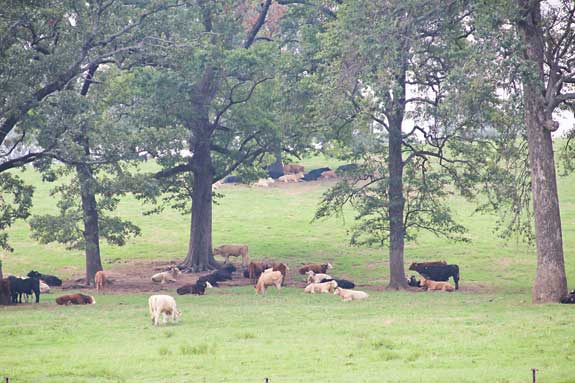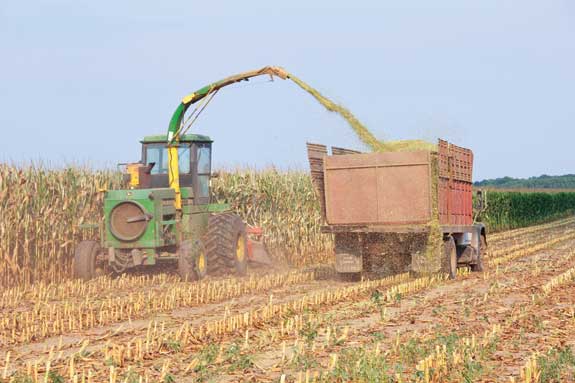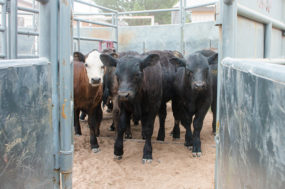Winrock Farms has maintained a reputation for producing quality cattle for 58 years. Herds of purebred Santa Gertrudis and Red Angus cattle graze the brow of Petit Jean Mountain near Morrilton, Arkansas. Winrock’s backgrounding operation nestles in the valley below.
The farm, originally designed for purebred seedstock sales, has diversified its offerings into custom grazing, backgrounding and beef production, which are all faithfully delivered with an unchanging heritage of business integrity.
Vice President Rocky Vess narrates a history of Winrock Farms, beginning in 1953 when Winthrop Rockefeller began to acquire land atop Petit Jean Mountain to run his starter herd of Santa Gertrudis stock.
“We have changed with the times,” Vess observed, “but the focus remains the same.” For years, the farm held annual production sales, but today the farm sells only by private treaty.
In the early ’70s when Winthrop died, his son, Win Paul, inherited Winrock Farms, which remained in his possession until his death in 2006.
Now, his wife maintains family ownership. Winrock inhabits 2,500 acres of mountaintop land in addition to 5,000 acres at its base, where calves from the southeastern U.S. enjoy room to grow and acclimate before their final destinations at feedyards farther north.
After 47 years of running only Santa Gertrudis cattle, the farm added a Red Angus herd in 2000 “to add a little carcass merit,” according to Vess.

Currently, Vess manages 100 Santa Gertrudis and 150 Red Angus-bred cows. Winrock sells 60 bulls a year to other producers that reside mainly within a 150-mile radius, but some purchases have been made by cattlemen as far away as the Texas coastal plain.
Commercial producers make up the majority of the seedstock customers.
Bulls undergo gain testing on the farm before their sale. Ideal progeny will have a medium frame, which is a good fit for the operation’s heavy dependency on forage resources.
Santa Gertrudis cattle work well in the Winrock environment because they tolerate heat better than other cattle.
“We sit on the line in between high heat and humidity. It can get pretty tough,” notes Vess. The Red Angus breed tends to be somewhat heat-tolerant, “but we still have a calf that we could go north with, as far as going to feedyards.”
Winrock believes firmly in maintaining a low-stress environment for their cattle. “We want to be as stress-free as possible on all cattle.”
Horses have gathered and tailed cattle ever since the ranch’s beginning and, over half a century later, they are still an integral part of effective low-stress handling.

“We don’t do any roping or pasture doctoring unless we have to,” Vess said. “Most of our yearlings are run in grass traps with doctoring facilities located in each trap.”
With all-season pastures lush with fescue, rye and bermudagrass, Winrock is blessed with more forage resources than its own herds can consume.
“We’re in the grass business,” Vess confirms. “We try to sell our grass.” The farm does not buy hay but instead produces haylage from excess grass they chop.
Sorghum and sorghum-sudan are also drilled into fields and chopped for haylage along with corn for silage. “We felt that hay was one of our main expenses that we had to get away from,”
Vess explains. Cattle from external sources are also invited to be custom grazed. A nutritionist advises all the operation’s rationing year-round.
Winrock commits to environmental stewardship. “We want to leave it better than it was found,” Vess promises. Buffers stand guard around streams and lakes.
“We really watch our streams,” he pointed out, since the operation borders a state park. They spread manures rather than synthetic fertilizer and very sparingly use chemical weed control.
Winrock manages its heat stress by pumping water to troughs in every pasture and ensuring protection with trees and sun shades.
Customers may choose from a long menu of Winrock’s breeding and herd maintenance services. Heifers can be sold preconditioned or artificially inseminated.
They will ship semen from a few of their bulls, but most of their progressive breeding techniques, such as embryo implantation and artificial insemination, are conducted for the sake of developing their own herds.
Winrock A.I.’s about half of the cows before turning out clean-up bulls on the herds. Because their genetics focus emphasizes on replacement heifers, Winrock will typically buy back heifer calves from bulls sold to area stockmen.
Heifers are often developed on the farm, synchronized and sold bred, which is a popular choice for area producers seeking their own replacement heifers.
Winrock offers its 60-day backgrounding service to feeders that acquire calves from the Southeast and ship them northward.
“We are straightening those cattle out,” Vess explains. “The calves we precondition are really high-risk calves. They’re coming out of the sale barn environment.
Most of them are bought in the deep Southeast and shipped to us bawling.” Upon arrival all calves are processed and receive EID tags before starting their 60-day layover in Conway County, Arkansas.
Vying for more profit opportunities, the farm entered a niche market by selling its own privately labeled USDA-inspected beef products.
Winrock feeds 50 to 60 bull calves annually that grow into a lean, easy fleshing product without using synthetic hormones.
They are harvested before 14 months of age to garner their youthful tenderness and avoid the toughening effects of maturity and testosterone.
Calves are given antibiotics only in life-threatening cases, and recipients are red-flagged so they do not enter their antibiotic-free production market.
Rocky Vess suggests having “cattle that will grow well on grass. This is one of our main priorities due to feed being one of the highest expenses I have.”

Dependence on the farm’s forage resources has helped smooth out the bumpy ride in the commodities market through the decade.
“Having moderate-framed, easy-doing cattle that can go out and make it, and then can breed back with minimal input” comprises Vess’s soundest investment strategy.
Diversification created a more versatile operation after the farm’s sole focus of producing a purebred herd met challenges. “We had to look at different ways of making it work.”
The future of Winrock Farms may involve further expansion of the backgrounding business. What will not change is the reason its vice president has stood by Winrock for 25 years.
A working environment that adheres to principles of good business has kept Vess and many others loyal to the farm and to its products for so long.
“When we sell something, we want to stand behind it. We want our bulls to go out and work for people. If they’re not good enough for us, they’re not good enough for anyone else,” Vess beamed.
Winrock Farms is more than just good history. According to Rocky Vess, “it’s like home.” ![]()
PHOTOS
PHOTO 1: An aerial view of Winrock Farms and its feeder operation at Morrilton, Arkansas.
PHOTO 2: The Red Angus cow is a principal tool for heat tolerance and carcass merit at Winrock Farms.
PHOTO 3: Custom fed cattle at Winrock Farms.
PHOTO 4: Corn is chopped with haylage into silage at Winrock. Photos courtesy of Winrock Farms






